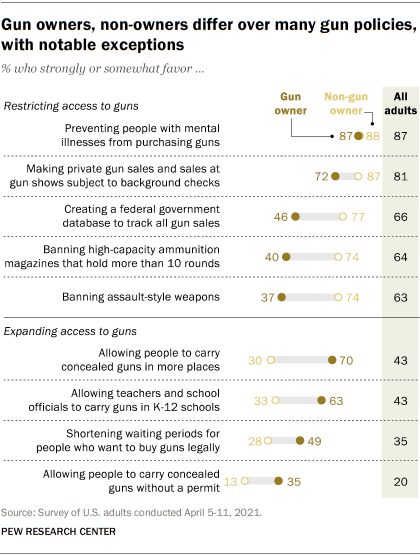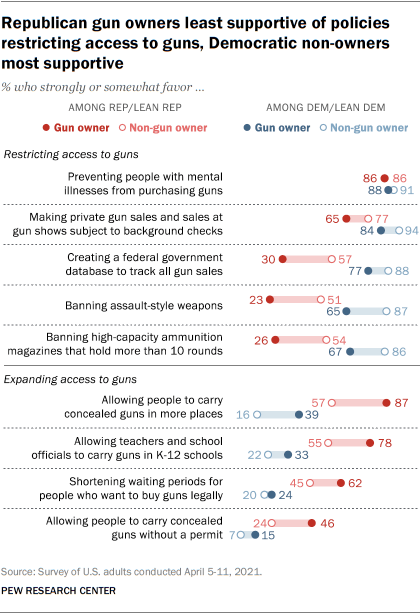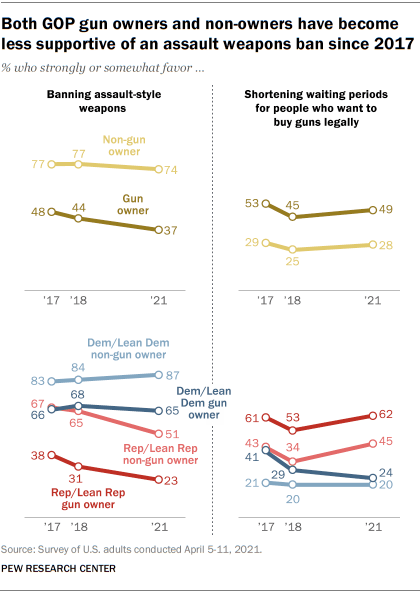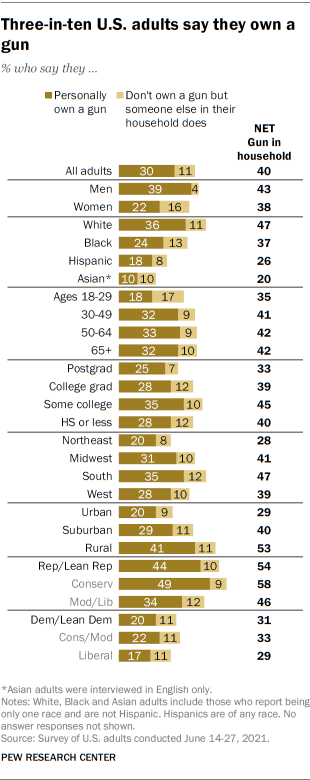
Gun owners in the United States have long favored more permissive gun policies while adults who do not own guns have tended to favor more restrictive policies. This pattern continues today. For example, 37% of gun owners favor banning assault-style weapons, compared with twice as many (74%) non-gun owners – and this gap has grown in recent years, according to a new analysis of Pew Research Center surveys conducted in April and June 2021.
To assess Americans’ views about gun policies, we surveyed 5,109 U.S. adults from April 5-11, 2021. Everyone who took part is a member of Pew Research Center’s American Trends Panel (ATP), an online survey panel that is recruited through national, random sampling of residential addresses. This way nearly all U.S. adults have a chance of selection.
A second survey was conducted with 10,606 ATP members from June 14-27, 2021, to assess gun ownership among Americans. The analysis of gun policy views among gun owners and non-owners was based on the 4,042 respondents to both surveys.
These surveys are weighted to be representative of the U.S. adult population by gender, race, ethnicity, partisan affiliation, education and other categories. A separate weight was computed for the combined April and June analysis. Read more about the ATP’s methodology.
Here are the gun ownership and gun policy questions used in this data analysis, along with its methodology.
Yet these differences in opinion between gun owners and non-owners do not apply to all gun policies. Gun owners are roughly as likely as non-owners to support preventing people with mental illnesses from obtaining guns. And sizable majorities of adults who own guns and those who do not both favor background checks for private gun sales and sales at gun shows.
Non-owners are 31 percentage points more likely than gun owners to say they favor creating a federal database to track all gun sales (77% vs. 46%), and there are similar sized gaps in opinion over banning high-capacity magazines and banning assault-style weapons, according to the analysis, which is based on an April 2021 survey on Americans’ attitudes about gun policy and a June 2021 survey on gun ownership.
The June 2021 survey, which was conducted June 14-27 among 10,606 adults, finds that 30% of adults say they own a gun, while another 11% say they personally do not own a gun but another member of their household does. Self-reported gun ownership has changed little in recent years.
Majorities of gun owners say they favor allowing concealed carry in more places and allowing teachers to carry guns in K-12 schools, but only about a third of non-owners support these policies. While gun owners are split over shortening waiting periods for those who legally want to buy guns (49% favor, 51% oppose), just 28% of non-owners support this. Most Americans – regardless of whether or not they own guns – oppose concealed carry without a permit, but gun owners (35%) are more likely than non-owners (13%) to support this.
Views on gun policies linked to both gun ownership and partisanship
While gun ownership is associated with views on gun policies, the sizable partisan differences in these policy attitudes are reflected among owners and non-owners as well. In general, Republican gun owners are less likely than GOP non-owners – and both Democratic owners and non-owners – to favor policies that restrict access to guns. Democratic non-owners are more likely than others to favor restrictions.
Gun owners and non-owners within each party differ on their views on gun policies. However, these differences are more pronounced among Republicans and Republican-leaning independents than they are among Democrats and Democratic leaners. (Note: Republicans are about twice as likely as Democrats to say they own a gun.)
Among Republicans, a 57% majority of those who don’t own a gun say they favor creating a federal government database to track all gun sales. By comparison, three-in-ten Republican gun owners say the same. There is a similar-sized gap among Republicans who own guns and those who do not on banning assault-style weapons and high-capacity magazines.
On proposals to expand access to guns, Republicans who own guns are much more likely to support these proposals than are non-owners. For example, an overwhelming majority of Republican gun owners (87%) say they favor allowing people to carry concealed guns in more places, while a smaller majority of those who don’t own a gun (57%) say the same.
There are modest differences among Democrats on gun policies by gun ownership. For instance, while majorities of Democratic gun owners and non-owners both favor banning assault-style weapons and banning high-capacity magazines, Democratic gun owners are about 20 percentage points less likely to say this. Democrats who own guns (39%) also are more likely than those who do not (16%) to say people should be allowed to carry concealed guns in more places.
While there has been a modest decline in support for an assault weapons ban among the public overall, much of this change is attributable to declining support for the policy among Republican gun owners and non-owners alike.
Among Republican gun owners, there has been a 15 percentage point decrease in support for banning assault-style weapons since 2017 (down from 38% to 23% today). There has been a similar 16-point decrease among Republicans who don’t own a gun on this proposal.
Democrats – both owners and non-owners – are about as likely as they were in 2017 to say they favor banning assault-style weapons.
While Republican gun owners and non-owners are both more likely to say they favor shorter waiting periods for people who want to buy guns legally today than they were in 2018, current opinions are similar to views in 2017.
By contrast, support for shorter waiting periods has declined among Democratic gun owners. In 2017, 41% of Democrats who owned a gun said they favored this policy. Today, about a quarter (24%) say this. Just 20% of Democrats who don’t own guns favor shorter waiting periods, which has remained virtually unchanged over the last few years.
Gun ownership more common among men, rural and White adults
Four-in-ten U.S. adults report that there is a gun in their household: Three-in-ten say they personally own a gun, while 11% say that they don’t own a gun, but someone else in their household does.
Gun ownership varies across demographic groups. About four-in-ten men say they personally own a gun, compared with 22% of women.
While 36% of White adults say they personally own a gun, smaller shares of Black (24%), Hispanic (18%) and Asian (10%) adults report owning a gun.
Adults under 30 are less likely to own a gun than those in older age groups: 18% of 18- to 29-year-olds own a gun, compared with a third of those ages 30 and older.
Americans who live in the Northeast are the least likely to say they own a gun, with 20% saying this. Americans who live in the South (35%), Midwest (31%) and the West (28%) are more likely to report owning a gun.
Gun ownership also widely varies by community type, with those who live in rural areas much more likely to say they own a gun. Overall, 41% of Americans who live in rural areas own a gun, compared with 29% of those in suburban areas and 20% of Americans who live in urban areas.
There are clear partisan divides when it comes to gun ownership: 54% of Republicans and Republican-leaning independents either personally own a gun (44%) or live in a house where someone else owns one (10%). By comparison, about three-in-ten (31%) Democrats and Democratic-leaning independents live in a household with a gun, with 20% reporting personally owning a gun.
While there are ideological differences on gun ownership in both parties, they are wider among Republicans. Nearly half of conservative Republicans say they own a gun (49%), while 34% of moderate and liberal Republicans say they do. Conservative and moderate Democrats are slightly more likely than liberal Democrats to say they own a gun (22% vs. 17%).
Measuring gun ownership comes with its own set of challenges. For example, unlike many demographic questions, there is not a definitive data source from the government or elsewhere on how many American adults own guns. This survey, conducted June 14-27, 2021, on Pew Research Center’s online American Trends Panel (ATP), asks about gun ownership by using two separate questions to measure personal and household ownership instead of collecting this information with a single question.
Collecting responses online has two advantages. First, respondents may be more willing to share sensitive information than they would be over the phone or in person. Furthermore, the survey was conducted among adults who have responded to the Center’s previous ATP surveys and thus may be more comfortable answering the questions. The share of U.S. adults in the new survey who report that they personally own a gun or live with someone who does is similar to what the Center has found in previous online surveys. These numbers are largely consistent with rates of gun ownership reported by the Gallup Organization, but somewhat higher than those reported by the General Social Survey. All three survey organizations find little change in individual gun ownership in recent years.




